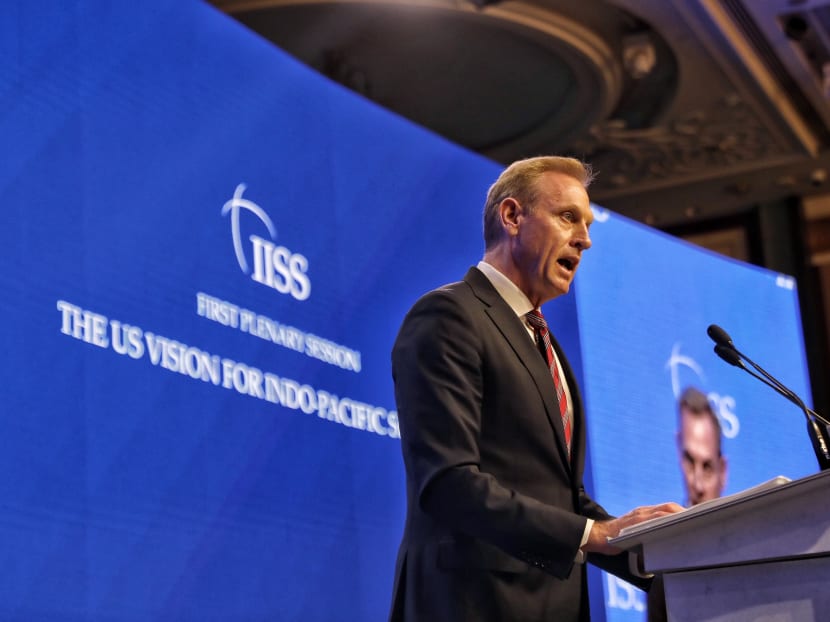Top US defence official at Singapore summit slams 'actors' who destabilise region
SINGAPORE — There are actors who seek to undermine the international order through activities such as influence operations and militarising disputed areas, and they present the “greatest long-term threat” to the region, Acting United States Defence Secretary Patrick Shanahan said on Saturday (June 1).

Acting United States Defence Secretary Patrick Shanahan, speaking at the Shangri-La Dialogue in Singapore on Saturday (June 1), slammed "actors" who conduct various activities, such as influence operations and militarising disputed areas, which destabilise the region.
SINGAPORE — There are actors who seek to undermine the international order through activities such as influence operations and militarising disputed areas, and they present the “greatest long-term threat” to the region, Acting United States Defence Secretary Patrick Shanahan said on Saturday (June 1).
While he did not name these “actors”, the US has previously made similar allegations against China.
Nonetheless, in his speech at a plenary session that lasted over an hour, Mr Shanahan also struck a conciliatory note, saying that the US and China could have a co-operative relationship, and America’s engagements in the region are now “deeper and broader”.
Mr Shanahan, who was speaking at the Shangri-La Dialogue, met Chinese Defence Minister, General Wei Fenghe, on Friday, in talks described as “constructive and productive”.
The two men discussed ways to build military-to-military ties that would reduce the risk of misunderstanding and miscalculation.
The Shangri-La Dialogue, an annual security summit, runs until Sunday.
DESTABILISING MOVES
In his speech on America’s vision for Indo-Pacific security, Mr Shanahan said there are actors who conduct destabilising moves such as deploying advanced weapon systems to militarise disputed areas, upsetting the peaceful status quo through the threat of force.
The Indo-Pacific is the maritime zone bordered by the Indian and Pacific Oceans, and includes all states within that spectrum.
The US has previously taken umbrage at China’s growing maritime dominance in the region, including its territorial claims in the South China Sea, a strategic waterway also contested by countries such as Brunei and the Philippines.
These actors, Mr Shanahan added, also use influence operations to “interfere in the domestic politics of other nations, undermining the integrity of elections and threatening internal stability”. They also promote “state-sponsored theft of other nations’ military and civilian technology”.
Mr Shanahan, a former senior executive with aircraft manufacturer Boeing, said that the US rejects actions that run counter to the order that “many of the countries represented in this room have built together”.
“We want a different future, a more promising future, one where small nations need not fear larger neighbours,” he added.
Mr Shanahan said that it is “in China’s interests” to have a co-operative relationship with the US.
“No country has benefited more from the regional and global order than China, which has seen hundreds of millions lifted from poverty to increasing prosperity,” Mr Shanahan said.
China and the US are entangled in a trade war, with extra tariffs imposed on billions of dollars of each other’s goods.
While the US teams up with China where their interests align, such as in tackling transnational threats such as piracy, Mr Shanahan said that it competes with China where it must.
“But competition does not mean conflict. Competition is not to be feared. We should welcome it, provided that everyone plays by internationally established rules,” said Mr Shanahan.
While the US will not ignore China’s behaviour, Mr Shanahan said that this was “not about being confrontational, (but) being open and having a dialogue”.
DISTRUST OVER HUAWEI
Wading into the US’ ban on Huawei’s sale of fifth-generation (5G) telecommunications equipment, Mr Shanahan said that the Chinese telecom giant was “too close to the government”.
“China has national policies and laws where data is required to be shared. So, when I look at that situation, that’s too much risk for the Department (of Defence),” he said.
“We can’t trust that those networks are going to be protected.”
In the face of concerns that China’s government could use Huawei’s 5G equipment for spying, several countries — including the US — have blocked the firm from selling the equipment on national-security grounds.
On Friday, in a speech to open the summit, Singapore Prime Minister Lee Hsien Loong noted the distrust over the roll-out of 5G networks.
He said that the Internet’s cloak of anonymity means everyone would deny intruding into other networks as they “won’t be found out”.
Under this cloak of anonymity, Mr Lee added that the incentive for non-state or state players to behave was “considerably diminished”.
General Wei, the first Chinese defence minister to attend the summit in eight years, will talk about China’s place in the Asia-Pacific region on Sunday.








